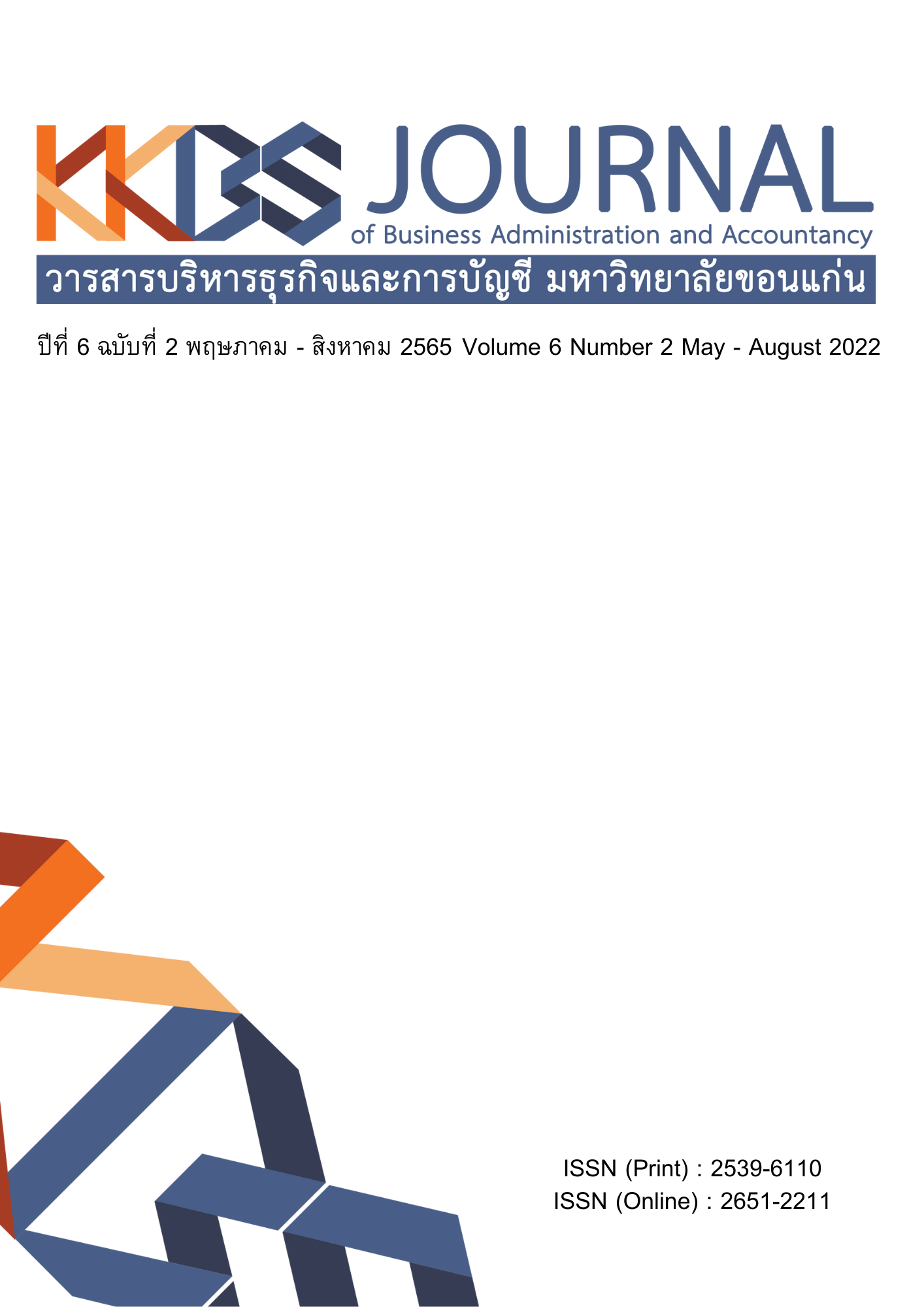Community Based Tourism Management of Ban Pon, Tambon Pon, Amphoe Kammuang, Changwat Kalasin
Main Article Content
Abstract
The study of Community- based Tourism Management of Ban Pon, Tambon Pon, Amphoe Kammuang, Changwat Kalasin aimed to 1) to study the tourism management of Ban Pon 2) to analyze the ability for managing tourism of Ban Pon 3) to present the guidelines for tourism development to Ban Pon. The research is mix method. The quantitative data collected from 362 questionnaires and the qualitative data collected from in-depth interview with related organizations. The data was analyzed by descriptive statistics and content analysis.
The result of this study showed that the most of the sample group was female, age range 45-49 years, marital status, primary education level, agriculture occupation and income per month between 5,001-10,000 baht. The participation of community tourism management was at high level ( X= 4.08). The highest value was physical (X = 4.21) and the lowest value is management ( X= 3.85). The potential of tourism components (5A’s) was high ( X= 4.14) the highest value was attraction (X = 4.18) The lowest value was amenity (X= 4.07). There are 3 guidelines of tourism development are guideline of human resource capacity development, guideline of promoting participation in community based tourism management and guideline of development of community based tourism elements to have the potential to support tourism.
Article Details

This work is licensed under a Creative Commons Attribution-NonCommercial-NoDerivatives 4.0 International License.
The articles published in the journals are the authors' opinions, not the opinion of the editorial team or administrative staff. The articles published is copyright of the Journal of Business Administration and Accounting, Khon Kaen University.
References
Boonyapak, W. (2007). The potential of cultural tourism. Bangkok: Thailand Research Fund. (In Thai)
Chanreungrit, T. (2018). Sustainable tourism approach, managed by community: A case study Chanthaboon Waterfront Community, Mueang District, Chanthaburi Province. Bangkok: Bangkok University. (In Thai)
Community Development Department. (2008). Guide for creating a learning process and a quality community plan in 2008. Bangkok: Community Development Department, Ministry of Interior. (In Thai)
Emphandhu, D. (2007). The development of community-based tourism and homestay activities. Bangkok: Kasetsart University. (In Thai)
Kantha-Oo, C. (2017). Community based tourism: A case study of Baan Rong Fong, Rong Fong Sub-District, Mueang Phrae District, Phrae Province. Bangkok: Chulalongkorn University. (In Thai)
Kaewhawong, T. (2000). The process of strengthening communities, communities, civil society. Khon Kaen: Klang Nana Vidhaya. (In Thai)
Khemnoi, S. (2011). Factors affecting participation in the management of sustainable tourism: A case study of Banglung Market, Ampphoe Banglen, Nakhon Pathom Province. Nakhon Pathom: Silpakorn University. (In Thai)
Mingmaneenakin, W. (1995). The Rural development in Thailand. Bangkok: Thammasat University. (In Thai)
Phongphanit, S. (2001). People's participation” the new role of the people in sustainable tourism. Retrieved September 21, 2020, from http://conservation.foret.ku.ac.t/ecotour/Cgibin/Article/communityparticipate. (In Thai)
Pinthong, J. (1995). Public participation in development. Bangkok: Saksupha Print. (In Thai)
Pisaipan, T. (2021). Community participation, Ban Pon. Interview October 15, 2021. (In Thai)
Singsaktrakul, P. & Sermkarndee, P. (2017). The study of potentiality and conservation tourism development approach of Baan Thung-Maprang, Kuan Doan District and Baan Ton-Panan, Kuan Kalong District in Satun Province. Suddhiparitad Journal, 27(83), 97-112. (In Thai)
Suansri, P. (2003). Guide to community tourism management. Bangkok: The Thailand Community Based Tourism Institute. (In Thai)
Sukbanjong, C. (2016). Sustainable tourism development of Nhanmoddang, Pa Phayom District, Phatthalung Province. Bangkok: Bangkok University. (In Thai)
TAT Review. (2019). Strategy to upgrade Thai tourism to benefit the community. Retrieved April 4, 2020, from https://www.tatreviewmagazine.com/article/cbt-thailand. (In Thai)
Thailand CBT Network Coordination Center. (2017). Principles of Community Tourism Development. Retrieved December 4, 2020, from https://district.cdd.go.th/huahin/wp-content. (In Thai)
Thanuphol, N. et al. (2000). Development of ecotourism in Ban-Pong community, Sansai, Chiangmai. Bangkok: Thailand Research Fund. (In Thai)
Tourism Authority of Thailand. (2002). Documents of ecotourism workshop under ecotourism promotion and development program in 2002. Bangkok: Tourism Authority of Thailand. (In Thai)
Thongchim, P. (2015). Managing collaboration in community based tourism on Lanta Island, Krabi Province. Songkla: Prince of Songkla University. (In Thai)
Worapradit, S. (2010). Community participation Division of Information Technology Office of the Non-Formal and Informal Education Trat Province. Trat: Office of the Non-Formal and Informal Education Trat Province. (In Thai)


